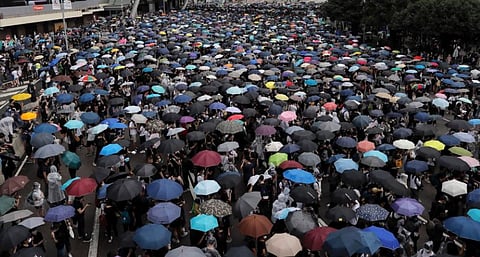
- Home
- Live Blog
- Breaking News
- Top Headlines
- Cities
- NE News
- Sentinel Media
- Sports
- Education
- Jobs

Hong Kong: A sea of people remained out on the streets of Hong Kong on Wednesday as the police used pepper spray to push back angry demonstrators rallying against an extradition bill that would allow people to be sent to mainland China for trial. Hundreds of thousands of protesters surrounded the city’s legislature that forced the Legislative Council to postpone the second debate on the controversial bill.
But the tense standoff on the streets continued unabated as the area around the Legislative Council was cordoned off by riot police as demonstrators - mostly young men and women - shouted anti-government slogans, Efe news reported. Many of the protesters were wearing masks to hide their identity and also protect themselves from the pepper spray used by the police to disperse them.
Photos published by South China Morning Post showed the demonstrators picking bricks from the sidewalks as they clashed with the police, intensifying the tension over the contentious extradition legislation. Many of the protesters were forced to leave the site after the police fired pepper spray as ambulances were seen heading towards the crowds.
The police were trying to evacuate the site and escort lawmakers who had come to the legislature for a second reading of the disputed bill, which would allow Hong Kong to process case-by-case extradition requests from mainland China, Taiwan and Macau and without direct legislative supervision. In posters flashed on Wednesday, some protesters denounced that the police were defending Hong Kong Chief Executive Carrie Lam when they should be doing their duty to protect protesters.
The President of the Legislative Council, Andrew Leung, decided to postpone the council meeting scheduled for Wednesday to a later time. The controversial bill which was proposed in February is expected to be put to a final vote on June 20. Once approved, the local courts will be able to review cases of such nature individually and use veto power to stop certain extraditions, although the Hong Kong Executive insists that the text intends to fill a legal void. (IANS)
Also Read: INTERNATIONAL